
The unstoppable rise of the 'domestic goddess'
 Alamy/ Getty Images/ Netflix(Credit: Alamy/ Getty Images/ Netflix)
Alamy/ Getty Images/ Netflix(Credit: Alamy/ Getty Images/ Netflix)Meghan's new Netflix series in which she offers cooking and home tips arrives next week. She's just the latest high-profile woman to present herself as a lifestyle guru – and divide opinion in doing so.
The Duchess of Sussex's lifestyle show is finally arriving on Netflix on Tuesday, after being pushed back because of the Los Angeles fires. With Love, Meghan sees her picking flowers, cooking with friends, and looking radiant in a huge, glossy Californian home.
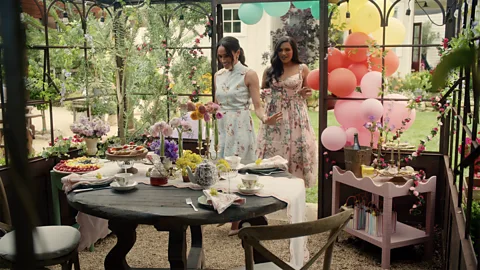 NetflixThe lifestyle TV show With Love, Meghan is likely to be a big ratings hit (Credit: Netflix)
NetflixThe lifestyle TV show With Love, Meghan is likely to be a big ratings hit (Credit: Netflix)The move into such well-worn domestic-goddess territory saw Meghan instantly dubbed "the millennial Martha Stewart of Montecito" in The New York Times. But of course, this being Meghan – the subject of a vast amount of criticism in the British media specifically and on social media generally – backlash flared the minute the trailer was released. She's flaunting her wealth, said her critics: tone-deaf. She's becoming a trad wife: bad feminist. She's fake, she just wants to sell products, she's unbearably earnest…
And yet, Meghan has her fans as much as her detractors, and it's likely that With Love, Meghan will be a ratings hit for the streamer, bringing people together: not always in the way the show intends perhaps, but by persuading both those who buy into the pretty-princess fantasy – and those who may "hate-watch" it – to tune in, agog. "Everyone's invited to create wonder in every moment" – as Meghan puts it.
The recent obsession with trad wives may reflect a broader disenchantment with modern lifestylesThe public's feelings towards domestic goddesses – those women who sell a lifestyle, and a very particular idealised version of womanhood – have always been complex, but they may have never been more conflicted than in 2025. "Of course, the image of the idealised woman has changed over time, and even more rapidly in recent years" says Dr Edith Hill, an Australian academic whose research is in social media, influencers and women's bodies online. These days, Hill tells the BBC, "there is no one ''ideal' image of a woman online, as each community and sub-community has their own version of the perfect creator." This means that the most famous end up both loved and loathed: figures like Meghan, Gwyneth Paltrow and Nara Smith walk the line between having devoted fanbases, and being scorned, castigated and even blamed for a wealth of societal ills.
 Getty ImagesGen Z's favourite domestic goddess is model Nara Smith – described by some as a trad wife (Credit: Getty Images)
Getty ImagesGen Z's favourite domestic goddess is model Nara Smith – described by some as a trad wife (Credit: Getty Images)Nara Smith is probably the most famous iteration of the most vexed contemporary version of the domestic goddess: the trad wife. Smith has 11.5 million followers on TikTok – that's a lot of people who want to watch videos from her home in Texas, where she raises kids and bakes their food from scratch. While wearing ballgowns. In a gorgeous kitchen. You could say it's aggressively aspirational – but it's also patently unrealistic. I doubt many people watching genuinely wish they too could make their toddlers homemade bubblegum while wearing a lime-green conical-bust gown.
More like this:
• How one surprising image kick-started the 1990s
• Ten of the best TV shows to watch this March
• Why influencers are facing a pushback
Of course, many women do find joy and satisfaction in the kitchen – or in other traditional domestic activities, such as hosting, home-making, arranging flowers, dressing in a feminine way… there's nothing inherently "unfeminist" with any of that. But the broader interest in trad wives – women who espouse traditional 1950s-style family values, and dedicate themselves wholly to keeping house and raising kids – has been seen by many as a worryingly retrograde step. Less domestic goddess, more domestic servitude, is the gist of the criticism. "There is a certain undertone from some of the more traditional creators that does lean toward very stereotypical gender roles and strong religious ideals, that can lead to the oppression of women," says Hill. "It would be naive to ignore the very close line that can be drawn between that content and women's oppression."
The recent obsession with trad wives may reflect a broader disenchantment with modern lifestyles: the anxiety that what equality of the sexes actually brought us is merely drudgery for all. When two parents have to work constantly in order to have enough money to live, and women also end updoing a "second shift" of housework and childcare, the old model of dividing the labour might look more appealing.
Arguably, we could more accurately place the source of the problem with capitalism, rather than feminism "gone too far". And it is unfortunately inevitable that full-time tradwiffery requires a partner who earns a lot of money, inevitably also bringing that traditional dynamic into play: domestic bliss predicated on man-as-breadwinner, woman-as-helpmeet.
The original domestic goddessesBut as much as there is endless hand-wringing in the media over the meaning of the trad-wife phenomenon, in some ways, it's nothing new: domestic goddesses have always been a source of fascination – dismissed as retrograde by some, and yet a source of aspiration, inspiration, and even compulsion for others. Because they don't just present a certain lifestyle: they often promise that you, scruffy disorganised frazzled ordinary woman, could be a domestic goddess too, if you just do what they say. Witness: the OG DG, Martha Stewart, who made a multi-million-dollar empire out of housekeeping tips.
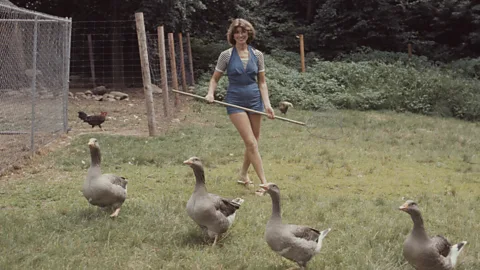 Getty ImagesVeteran lifestyle guru Stewart has her detractors but has long been a source of inspiration to many (Credit: Getty Images)
Getty ImagesVeteran lifestyle guru Stewart has her detractors but has long been a source of inspiration to many (Credit: Getty Images)Stewart made her name as a hard-grafting lifestyle guru who would tell you exactly what to do, and how to do it properly, whether putting up a shelf or planning a wedding. And part of the appeal of domestic goddesses has always been this illusion of control, of solution: do this, and have a better life.
Stewart started out running a catering business in 1975, before publishing the legendary 1982 glossy how-to guide, Entertaining. It was just the starting gun of the unstoppable Martha Stewart brand, that's since flogged everything from tea towels to CBD gummies; she's published more than 100 books offering brisk guidance on gardening, hosting, cooking and homemaking. And the news that Entertaining is to be republished this year surely supports the theory that we're in a retro domestic goddess moment.
Following in Martha's footsteps came another US DG who inspires a devoted following: Ina Garten aka The Barefoot Contessa. Garten just published a memoir, Be Ready When the Luck Happens, designed to persuade people that her seemingly charmed career – from running a Hamptons food store so casually chic that it featured in a Nancy Meyers movie, to fronting scores of cookery books and TV shows since the 90s – was the result of hard work and good timing, a blend of effort and effortlessness.
Garten's recipes also straddle effort and effortlessness: she specialises in rich, indulgent, bistro-style deliciousness, and offers detailed instruction as to exactly how to achieve it. But she's won fans for her catchphrase "store-bought is fine": a pinch of realism amid the lifestyle gloss.
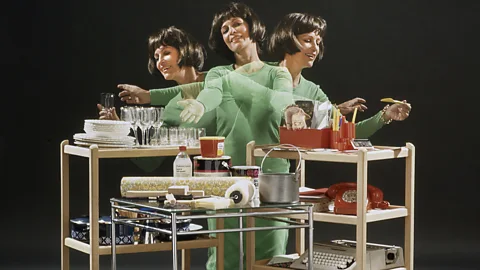 AlamyShirley Conran's 1975 book Superwoman was full of household tips and labour-saving shortcuts (Credit: Alamy)
AlamyShirley Conran's 1975 book Superwoman was full of household tips and labour-saving shortcuts (Credit: Alamy)And of course, not all domestic goddesses have been about perfection or spending hours in the kitchen – in fact, many have made a career out of proffering tips and tricks to make hosting and homemaking easier. Shirley Conran, the British journalist and author – also sometimes called the "original" domestic goddess – promoted the idea of women "having it all", and famously informed women in her 1975 pop-feminism housework manual Superwoman that "life is too short to stuff a mushroom". Nara Smith clearly didn't get the memo.
The idea of Superwoman was to liberate women from the tyranny of housework and perfection, not to be trapped by it: a domestic goddess in the 70s was the woman who had it all – job, home, marriage, kids, good sex, control of their finances, and a general air of fabulousness. The title was not actually meant to be taken seriously: "A Superwoman isn’t a woman who can do anything, but a woman who avoids doing too much," Conran wrote.
And missing the irony has often been an issue for DGs – not least for the deliciously tongue-in-cheek Nigella Lawson, who helped popularise the term. The curvaceous, flirtatious British chef also began her career with a book full of time-saving tips and anti-perfectionist reassurance: "Never worry about what your guests will think of you," she wrote encouragingly in How to Eat. "Just think of the food. What will taste good?"
A domestic goddess became a standard to live up to, and yet another reason for women to feel inadequateBut her second book in 1998 was called How to Be a Domestic Goddess – a joke that was missed, she's long insisted, and a title that now makes her cringe. "It was supposed to be ironic," she told the New York Times in 2019. Today, Lawson is a full-on national treasure in the UK, but at the start of her fame, and rather like today's trad wives, she was castigated by some critics who accused her of setting back feminism. She has since countered her critics by describing baking as feminist.
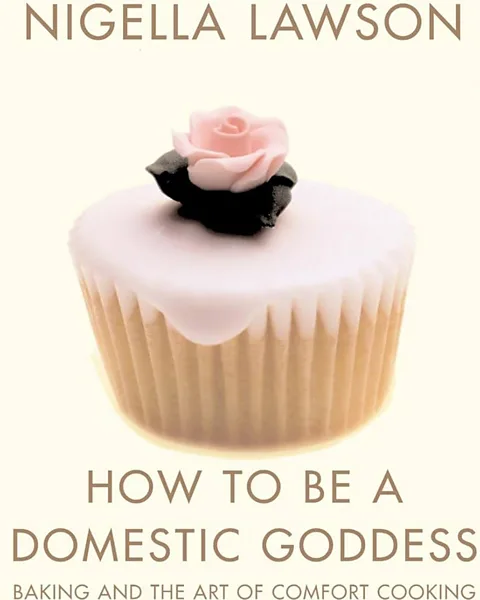 Chatto & WindusThe title of Nigella Lawson's 1998 book was intended to be ironic and tongue in cheek, according to the author (Credit: Chatto & Windus)
Chatto & WindusThe title of Nigella Lawson's 1998 book was intended to be ironic and tongue in cheek, according to the author (Credit: Chatto & Windus)A domestic goddess became a standard to live up to, and yet another reason for women to feel inadequate. And this is the contradiction at the heart of DGs, whether they’re incredibly earnest (Meghan; Gwyneth) or winkingly ironic (Lawson): while many give off an air of effortlessness and espouse mantras of ease for most women most of the time, such domestic bliss is actually not easy. Or, indeed, affordable. "We're not in the pursuit of perfection, we're in the pursuit of joy," declares Meghan in the trailer for her show. But it's hard not to feel like it would be a lot easier to pursue joy if you lived in a Californian mansion with help. To state the obvious, an enviable, idealised lifestyle is more readily available when you don't have to stress about the bills, and instead have the free time to, say, learn to fold a napkin like an Easter bunny.
It is also so obvious as to be almost banal to point out that DGs are mostly very wealthy. And fortune begets fortune: all this lifestyle content is, on some level, also an advert for the DGs' product lines, whether that's Meghan's company, As Ever, selling jams, Ina's cookware, or Gwyneth’s Goop empire.
 Getty ImagesDespite criticism over the years, Lawson has become something of a national treasure in the UK (Credit: Getty Images)
Getty ImagesDespite criticism over the years, Lawson has become something of a national treasure in the UK (Credit: Getty Images)For some, the wholesome, homespun emphasis on making preserves or crafting your own table decorations is particularly grating precisely because these women are clearly monied and leisured enough to have time for all that. Yet for others, that's what's appealing, even soothing, about watching them: we may not have a spare four hours to bake, but we can watch a four-minute video of Nara Smith baking; we may not have the money to make like Virginia Woolf's Mrs Dalloway at the opening of the eponymous novel, and buy the flowers ourselves, but we can watch Meghan pick out blooms in a fancy florist.
"The domesticity is presented to us as peaceful while also fulfilling," says Hill, on the appeal of this sort of content, which it is so easy to be cynical about. "Many people can relate to wanting to nourish and nurture their families, but what this looks like in reality for everyone else is at complete odds to the image we're presented through these curated narratives."
Perhaps this is the key: we mustn't mistake today's goddesses with mere mortals – consider them floating fictional constructs, higher(-earning) beings. And absolutely not a yardstick against which to measure ideal femininity. "I think we can be inspired by these women and the lives they are presenting," say Hill, "while also recognising it is wholly impossible to attain."
With Love, Meghan is on Netflix from 4 March
Holly Williams's novel, The Start of Something, is out in paperback now
--
If you liked this story, sign up for The Essential List newsletter – a handpicked selection of features, videos and can't-miss news, delivered to your inbox twice a week.
For more Culture stories from the BBC, follow us on Facebook, X and Instagram.
TelevisionComment & AnalysisCelebritiesLifestyleFeaturesWatch The making of the legendary Samarkand bread
The making of the legendary Samarkand breadBread is sacred in Uzbekistan. The BBC visits Samarkand to see how the fabled wheel-shaped bread loaves are made.
18 hrs agoTravel Tom Brook predicts this year's Oscars winners
Tom Brook predicts this year's Oscars winnersThe Talking Movies presenter on his predictions for the Academy Awards, from Best Picture to Best Animated Film.
3 days agoFilm & TV US January price data cools inflation fears - 28 Feb 2025
US January price data cools inflation fears - 28 Feb 2025Data shows that US inflation is in control, but tariffs are the likely cause of markets dipping says expert.
3 days agoOpening Bell Rolex – Reach for the crown
Rolex – Reach for the crownRolex – Reach for the crown
3 days ago Touring the real-life Anora in Coney Island
Touring the real-life Anora in Coney IslandThe award-winning film is based in various parts of New York and location manager Ross Brodar gave us a tour.
4 days agoFilm & TV EU tariff threats focused on car industry - 27 Feb 2025
EU tariff threats focused on car industry - 27 Feb 2025Justus Parmar says US President Trump has now put the EU in his crosshairs.
4 days agoOpening Bell Raye: Resilience is key when pursuing career in music
Raye: Resilience is key when pursuing career in musicBritish singer-songwriter speaks to BBC 100 Women about life as an independent artist and her fears about fame.
4 days ago100 Women Extra Markets muted ahead of US employment numbers - 26 Feb 2025
Markets muted ahead of US employment numbers - 26 Feb 2025Joy Yang says investors are hungry for any new data on the strength of the economy.
5 days agoOpening Bell When Chris O’Dowd met Beyoncé
When Chris O’Dowd met BeyoncéThe actor reveals his response after Beyoncé complimented him on his voice.
5 days agoFilm & TV The perplexing history of the chameleon
The perplexing history of the chameleonDavid Attenborough tells the story of the animal that once bewildered scientists.
5 days agoNatural wonders Markets open mixed over consumer spending - 25 Feb 2025
Markets open mixed over consumer spending - 25 Feb 2025Expert says majority of consumers are still struggling with high prices.
6 days agoOpening Bell The Lion King: How Mufasa was brought to life
The Lion King: How Mufasa was brought to lifeBBC Click speaks to the visual effects team behind the latest Disney blockbuster.
6 days agoInnovation Apple announces $500bn in US investments - 24 Feb 2025
Apple announces $500bn in US investments - 24 Feb 2025An arms race in AI revolution is playing out among the major tech giants, an expert says.
7 days agoOpening Bell Keeping traditional Icelandic knitting alive
Keeping traditional Icelandic knitting alivePresenter Roma Wells heads to the north of Iceland to learn how to knit the true Icelandic way.
7 days agoAdventures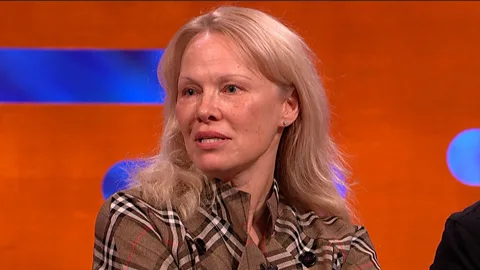 How Pamela Anderson was discovered
How Pamela Anderson was discoveredHer career took off after being spotted in the crowd by a cameraman at a football game.
8 days agoFilm & TV Demand for AI very visible and strong for 2025 - 21 Feb 2025
Demand for AI very visible and strong for 2025 - 21 Feb 2025The year ahead will see 'more evened out returns across the equity market', according to Jan Van Eck of VanEck.
21 Feb 2025Opening Bell Timothée Chalamet and Edward Norton on A Complete Unknown
Timothée Chalamet and Edward Norton on A Complete UnknownThe Hollywood stars on playing Bob Dylan and Pete Seeger and how director James Mangold trusted them.
21 Feb 2025Film & TV How the TikTok ban affected US influencers
How the TikTok ban affected US influencersBBC Click meets TikTok creator Peggy Xu who gained millions of views sharing milk videos.
21 Feb 2025Technology How to change your personality traits with intention
How to change your personality traits with intentionOur personality is not fixed and we have the power to change how we think and behave.
20 Feb 2025Health Decoded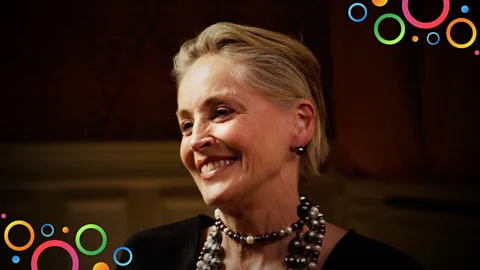 Sharon Stone: 'I was punished for my sexuality'
Sharon Stone: 'I was punished for my sexuality'The Hollywood star tells the BBC how she used her fame as a sex symbol to raise money for humanitarian causes.
20 Feb 2025100 Women ExtraMore15 hrs ago A 300km hike into Sri Lanka's lush Highlands
A 300km hike into Sri Lanka's lush HighlandsThe recently opened Pekoe Trail, which runs for more than 300km through tea plantations, villages and forests, tells the story of Sri Lanka's complex and chequered tea history.
15 hrs agoTravel19 hrs ago How five YouTube videos changed the world
How five YouTube videos changed the worldAs YouTube turns 20 years old, the platform's content has fundamentally altered the way we think and feel about each other, and ourselves.
19 hrs agoFuture1 day ago The scenic German city that inspired a horror film
The scenic German city that inspired a horror filmMore than a century after its medieval centre served as the backdrop of Nosferatu, a new Oscar-nominated remake is putting this Gothic city back on the map.
1 day agoTravel2 days ago A soca musician's guide to Trinidad and Tobago
A soca musician's guide to Trinidad and TobagoSoca musician Machel Montano shares his recs for enjoying his home nation during Carnival season and beyond.
2 days agoTravel2 days ago Why Vermont farmers are using urine on their crops
Why Vermont farmers are using urine on their cropsUrine was used as fertiliser in ancient Rome and China. Now farmers in Vermont are bringing this practice back to boost harvests and grow crops in a more sustainable way.
2 days agoFutureAP by OMG
Asian-Promotions.com |
Buy More, Pay Less | Anywhere in Asia
Shop Smarter on AP Today | FREE Product Samples, Latest
Discounts, Deals, Coupon Codes & Promotions | Direct Brand Updates every
second | Every Shopper’s Dream!
Asian-Promotions.com or AP lets you buy more and pay less
anywhere in Asia. Shop Smarter on AP Today. Sign-up for FREE Product Samples,
Latest Discounts, Deals, Coupon Codes & Promotions. With Direct Brand
Updates every second, AP is Every Shopper’s Dream come true! Stretch your
dollar now with AP. Start saving today!
Originally posted on: https://www.bbc.com/culture/article/20250228-the-unstoppable-rise-of-the-domestic-goddess?ocid=global_culture_rss
